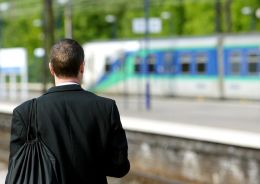Posted 21st November 2008 | 2 Comments
Train delays cost passengers £1 billion

Train punctuality is getting better but at a cost for the passenger.
ALTHOUGH train punctuality in Britain is currently reported to be up to 92 per cent, delays are costing passengers £1 billion a year in lost time and there is a risk that passengers are not claiming the compensation to which they are entitled.
These are among the findings of the House of Commons Public Accounts Committee, which has investigated the rail industry’s management of incidents and published a 35-page report.
It states that performance — punctuality measured within five minutes of scheduled times, or 10 minutes for longer-distance InterCity services — has only just returned to the levels that existed before the Hatfield derailment, eight years ago.
“However, these improvements in performance have come at a significant cost to the taxpayer,” says the committee, with the government in 2006/7 contributing £5.1 billion — £3.4 billion to Network Rail and £1.7 billion to TOCs — while passengers also paid £5.1 billion in fares “… and the National Audit Office has estimated that delays cost them £1 billion in terms of lost time.”
The committee of MPs is critical of both Network Rail and the Office of Rail Regulation (ORR), saying passengers “are not receiving the information they need during delays and are not always told how to claim compensation for delays.”
The MPs want the DfT to “strengthen the governance and accountability arrangements of the rail industry to make Network Rail more directly accountable to the taxpayer for the money that it receives and for improving passenger rail services.”
They say Network Rail receives over half of its funding from the taxpayer “but as a private sector company it is not directly accountable to Parliament.”
The MPs also criticize the ORR for setting five-year targets for Network Rail but not then revising them to reflect changes in circumstances.
The committee wants the DfT and Passenger Focus to do more to ensure passengers get “the information they need during delays” and know how to claim compensation for delays.
To improve response to major incidents the MPs also want improved relationships with the emergency services.
“Approximately 20 per cent of the most disruptive incidents examined by the National Audit Office involved the attendance of one or more of the emergency services,” says the committee’s report, “but the relationships between the rail industry and the emergency services are fragmented.
“The DfT should play a more active role in bringing together the rail industry, the emergency services and other stakeholders (such as coroners, the Samaritans and Passenger Focus) to improve incident management, for example, by organising an annual conference. It should also look to other transport sectors and other industries to identify expertise that will benefit the rail sector.
“Many emergency services deal infrequently with the rail industry and do not always have sufficient information to enable them to make contact promptly when required. The Office of Rail Regulation should provide assurance to the DfT that Network Rail has appropriate mechanisms in place to allow the emergency services to contact relevant rail staff during incidents.”
Reader Comments:
Views expressed in submitted comments are that of the author, and not necessarily shared by Railnews.

Magellan, London
Just how much more accountable do you want the rail companies to be?
If MPs had it their way, and gained direct oversight of Network Rail, it would not be long before the railways were back in the same mess they were in the days of British Rail.
leslie burge, leicester, england
Rail companies need to become more accountable
I've had two instances recently whereby a train from
london to rugby via northampton was cancelled never even
received a reply to the complaint.
The second incident was to Stafford from Birmingham
via Walsall.Only for the train to be cancelled from
Rugely onward.
The onboard train staff were apologetic but said this
frequently happened if a train was late basically to hit
targets on Punctuality'